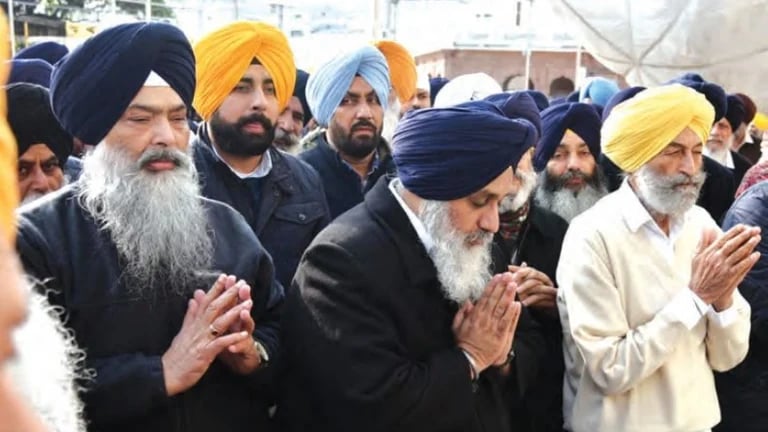The birth of a new, self-styled ‘Panthic’ party in Punjab, at a time when the Shiromani Akali Dal (SAD) shows signs of emerging from its decade-long crisis of credibility, is bound to have mixed effects on the political landscape of the border state.
On the one hand, the new party, mooted by jailed MP Amritpal Singh, is decidedly radical in ideology. The Dubai-returned preacher-activist, arrested under the NSA in 2023, has arrogated to himself the task of representing Sikh interests, on the premise that the SAD—the traditional Panthic party—has failed to do so. If this overtly hardline outfit gains control of the Shiromani Gurudwara Prabandhak Committee (SGPC), the fallout could be serious.
On the other hand, this development is likely to galvanise the SAD into reclaiming the Jat Sikh vote base it alienated during a decade (2007–2017) of self-serving governance. The resignation of former Deputy Chief Minister Sukhbir Singh Badal as party president, his 10-day public penance at the behest of the supreme religious authority of the Sikhs (Akal Takht), and the assassination attempt on him during that period mark a critical starting point.
Encouragingly, Badal has projected a moderate stance as the best way forward for Punjab and the Sikhs. He has apologised for past mistakes, promised a path of “peace and progress,” and warned against a radical agenda that could lead to “fratricidal bloodshed.” Badal is not wrong. Historically, the decline of the SAD has tended to create a vacuum filled by extremist elements. A strong, moderate Panthic party committed to peace, development, and social welfare is vital for Punjab.
Badal has sought to allay fears that the SAD would adopt a more radical stance to combat Amritpal and his ilk. However, he cannot replace his late father, Parkash Singh Badal, as the leader of the community. Indeed, many of the politically expedient policies that led to Punjab’s ongoing economic and social crises—and pervasive corruption—have been laid at his door. The SAD needs to project a fresh face.
The immediate challenge for the SAD is to win the much-delayed SGPC elections. Why? Because Punjab’s politics has long been shaped by the interdependence between the SGPC, the SAD, and the Akal Takht. The SAD and SGPC both emerged from the Gurudwara Reform Movement of the 1920s. As a party representing the Panth (a collective term for the global Sikh community), the Akali Dal has always emphasised Sikh regional and cultural identity.
The SGPC, a statutory elected body representing all Sikhs, appoints the jathedar (head) of the Akal Takht, who wields tremendous moral authority. The Akal Takht’s power derives from the principle of miri-piri—the harmonious balance of worldly and spiritual affairs, politics and religion. It steps in during social or political crises to restore balance and impose penance on wrongdoers.
Amritpal Singh’s party styles itself as the ‘Akali Dal – Waris Punjab De,’ referencing both its claim to being a Panthic party and its origins. Waris Punjab De, founded by the late actor-activist Deep Sidhu to address farmers’ issues, took a right-wing turn under Amritpal Singh.
The much-delayed SGPC elections are likely to occur this year, as electoral rolls will be notified on February 25. Amritpal’s party has announced its intent to contest all seats. Thus far, the SAD has dominated the SGPC, with a majority win in 2011. Prominent figures such as Master Tara Singh, Mohan Singh Tur, Gurcharan Singh Tohra, Jagdev Singh Talwandi, and Bibi Jagir Kaur have led the SGPC. The current incumbent, Harjinder Singh Dhami, defeated Kaur, who represented an SAD rebel faction.
Punjab’s Panthic politics has always involved an interplay of moderate, extremist, and militant elements. Consequently, the SAD has frequently faced rebellions and splits, as happened last year. Notably, the last time the SAD was seen as failing the Panth, Punjab endured a decade-long militancy phase.
What about AAP and Congress, the dominant parties in Punjab? The ruling AAP appears to be undergoing internal turmoil, with CM Bhagwant Mann’s loyalists removed from the state cabinet and CM’s office. Mann also announced his resignation as state party chief. He has struggled to address the ongoing farmers’ agitation and Punjab’s economic free fall. Meanwhile, Congress, having won seven of 13 Lok Sabha seats last year, senses an opportunity in the 2027 assembly elections.
Neither AAP nor Congress can afford to let Amritpal’s party gain ground. Nor can they avoid engaging in the fight. While Punjab’s current unrest stems largely from the Badal years—marked by deindustrialisation, unemployment, drug mafias, and a financial crisis—a resurgent SAD is far preferable to a radical outfit. The ominous cry of Panth khatre vich (“Panth in crisis”) demands a united front against extremists.
Bhavdeep Kang is a senior journalist with 35 years of experience in working with major newspapers and magazines. She is now an independent writer and author
